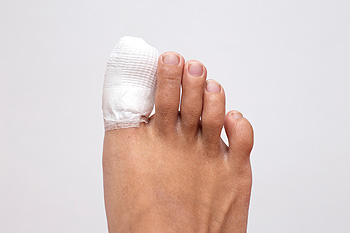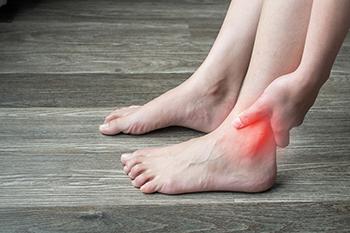Connect With Us
Blog

A broken toe might seem minor, but it can be surprisingly painful and disruptive. Toe fractures happen from direct impact, like stubbing a toe on furniture, dropping something heavy on it, or even excessive stress from repetitive movements. There are different types of toe fractures. A stress fracture develops over time from repeated strain, common in runners and athletes. A non-displaced fracture means the bone has cracked but remains aligned, while a displaced fracture occurs when the bone shifts out of place. A comminuted fracture involves multiple breaks in the same bone, and an open fracture means the bone has pierced the skin, requiring immediate medical attention. Treatment depends on severity, ranging from taping the injured toe to its neighbor for stability to wearing a stiff-soled shoe. Severe cases may require a splint or even surgery to ensure proper healing. If you have severe pain from a broken toe, it is strongly suggested that you schedule an appointment with a podiatrist for appropriate treatment.
Broken toes may cause a lot of pain and should be treated as soon as possible. If you have any concerns about your feet, contact Dr. Richard Silverstein from Union Foot Care. Our doctor will treat your foot and ankle needs.
What Is a Broken Toe?
A broken toe occurs when one or more of the toe bones of the foot are broken after an injury. Injuries such as stubbing your toe or dropping a heavy object on it may cause a toe fracture.
Symptoms of a Broken Toe
- Swelling
- Pain (with/without wearing shoes)
- Stiffness
- Nail Injury
Although the injured toe should be monitored daily, it is especially important to have a podiatrist look at your toe if you have severe symptoms. Some of these symptoms include worsening or new pain that is not relieved with medication, sores, redness, or open wounds near the toe.
If you have any questions, please feel free to contact our office located in Havre de Grace, MD . We offer the newest diagnostic and treatment technologies for all your foot care needs.

Running outdoors and on a treadmill each place different demands on the feet, toes, and ankles. Treadmill running offers a flat, cushioned surface that may reduce impact and be easier on the joints, but it can also limit the engagement of stabilizing muscles in the ankles and feet. Because the treadmill belt assists forward movement, runners may experience shorter strides and reduced ankle flexing movement. In contrast, outdoor running requires the body to adapt to uneven terrain, which strengthens the smaller muscles in the feet and ankles, but may also increase the risk of sprains, stress fractures, and tendon strain. Foot positioning, stride length, and ankle alignment can vary significantly depending on the running surface, and these differences can affect the arches, toes, and heel strike. Plus, improper footwear or technique in either setting can lead to pain or injury over time. A podiatrist can evaluate foot mechanics, identify imbalances, and recommend running strategies or footwear to help prevent injuries for either running surface. If you have foot problems related to running, it is suggested that you schedule an appointment with a podiatrist for an exam and appropriate treatment.
Exercising your feet regularly with the proper foot wear is a great way to prevent injuries. If you have any concerns about your feet, contact Dr. Richard Silverstein of Union Foot Care. Our doctor will treat your foot and ankle needs.
How to Prevent Running Injuries
Many common running injuries are caused by overuse and overtraining. When the back of the kneecap starts wearing out and starts causing pain in your knee, this is commonly referred to as runner’s knee. Runner’s knee is a decrease in strength in your quadriceps and can occur if you’re not wearing properly fitted or supporting shoes. To prevent runner’s knee, focusing on hip strengthening is a good idea, as well as strengthening your quads to keep the kneecaps aligned.
What Are Some Causes of Running Injuries?
- One cause of a common running injury is called iliotibial band syndrome.
- Plantar fasciitis is also another common injury.
- Stress fractures can occur from overtraining, lack of calcium, or even your running style.
Best Ways to Prevent Running Injuries
- Wear footwear that fits properly and suits your running needs.
- Running shoes are the only protective gear that runners have to safeguard them from injury.
- Make a training schedule. Adding strengthening exercises as well as regular stretching can help keep you strong and limber and can lessen the possibility of injuries.
- Stretching keeps muscles limber; this will help you gain better flexibility.
If you have any questions please feel free to contact our office located in Havre de Grace, MD . We offer the newest diagnostic and treatment technologies for all your foot and ankle needs.

Ankle pain can result from various conditions that affect the bones, ligaments, or tendons. Sprains occur when the ligaments that support the ankle stretch or tear due to sudden twisting movements, leading to pain and swelling. Arthritis, including osteoarthritis and rheumatoid arthritis, can cause stiffness, inflammation, and chronic discomfort in the ankle joint. Injuries to the Achilles tendon, such as tendonitis or ruptures, often develop from overuse, sudden strain, or degeneration over time. Fractures occur when one or more bones in the ankle break due to trauma or excessive force, resulting in severe pain, swelling, and difficulty bearing weight. If you have ankle pain, it is suggested that you promptly contact a podiatrist who can identify the underlying cause and offer appropriate treatment options.
Ankle pain can have many different causes and the pain may potentially be serious. If you have ankle pain, consult with Dr. Richard Silverstein from Union Foot Care. Our doctor will assess your condition and provide you with quality foot and ankle treatment.
Ankle pain is any condition that causes pain in the ankle. Due to the fact that the ankle consists of tendons, muscles, bones, and ligaments, ankle pain can come from a number of different conditions.
Causes
The most common causes of ankle pain include:
- Types of arthritis (rheumatoid, osteoarthritis, and gout)
- Ankle sprains
- Broken ankles
- Achilles tendinitis
- Achilles tendon rupture
- Stress fractures
- Tarsal tunnel syndrome
- Plantar fasciitis
Symptoms
Symptoms of ankle injury vary based upon the condition. Pain may include general pain and discomfort, swelling, aching, redness, bruising, burning or stabbing sensations, and/or loss of sensation.
Diagnosis
Due to the wide variety of potential causes of ankle pain, podiatrists will utilize a number of different methods to properly diagnose ankle pain. This can include asking for personal and family medical histories and of any recent injuries. Further diagnosis may include sensation tests, a physical examination, and potentially x-rays or other imaging tests.
Treatment
Just as the range of causes varies widely, so do treatments. Some more common treatments are rest, ice packs, keeping pressure off the foot, orthotics and braces, medication for inflammation and pain, and surgery.
If you have any questions, please feel free to contact our office located in Havre de Grace, MD . We offer the newest diagnostic and treatment technologies for all your foot care needs.
Blog Archives
- April 2025
- March 2025
- February 2025
- January 2025
- December 2024
- November 2024
- October 2024
- September 2024
- August 2024
- July 2024
- June 2024
- May 2024
- April 2024
- March 2024
- February 2024
- January 2024
- December 2023
- November 2023
- October 2023
- September 2023
- August 2023
- July 2023
- June 2023
- May 2023
- April 2023
- March 2023
- February 2023
- January 2023
- December 2022
- November 2022
- October 2022
- September 2022
- August 2022
- July 2022
- June 2022
- May 2022
- April 2022
- March 2022
- February 2022
- January 2022
- December 2021
- November 2021
- October 2021
- September 2021
- August 2021
- July 2021
- June 2021
- May 2021
- April 2021
- March 2021
- February 2021
- January 2021
- December 2020
- November 2020
- October 2020
- September 2020
- August 2020
- July 2020
- June 2020
- May 2020
- April 2020
- March 2020
- February 2020
- January 2020
- December 2019
- November 2019
- October 2019
- September 2019
- August 2019
- July 2019
- June 2019
- May 2019
- April 2019
- March 2019
- February 2019
- January 2019
- December 2018
- November 2018
- October 2018
- September 2018
- August 2018
- July 2018
- June 2018
- May 2018
- April 2018
- March 2018
- February 2018
- January 2018
- December 2017
- November 2017
- October 2017
- September 2017
- August 2017
- July 2017
- June 2017
- May 2017
- April 2017
- March 2017
- February 2017
- January 2017
- December 2016
- November 2016
- October 2016
- September 2016
- August 2016
- July 2016
- June 2016
- May 2016

